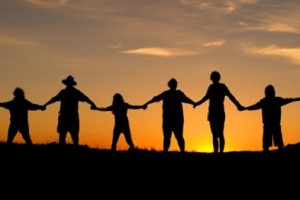
Have you ever seen or been on a team that just clicked, everything went well, even when there were obstacles? It is fun to be on a team like that. Have you ever been on a team that no matter how hard you worked the team never quite gelled and what you hoped to accomplish never quite happened. That can be very discouraging. So what is it that makes the difference in a great team and one that does not reach its potential? How does what we learn help us in our families, our most important team.
Great teams and teams that are fun to be on may not always win. But on great teams, that never seems to persuade them from having a positive attitude. Even when things do not go as planned or hoped for, the members of the team always look on the bright side and are willing to give credit to each other and appreciate the effort that they put into the task at hand.
Great teams display great sportsmanship. No matter if they win or lose, they are fair and kind both to each other and those that they played against. They put forth their best effort and play by the rules, never cheating or lying. Teams that display sportsmanship are willing to compliment others for a job well done instead of bragging, criticizing or making fun of others on or off of their team.
Great teams and teammates will still make mistakes and not do the job they were assigned as well as they wished they had. But instead of trying to find someone else to blame, they quickly acknowledge their mistakes, learn from them and then work on doing better the next time. All of these things are true of teams that we play and work on, but they are also true of our most important team – our family.
In our family we want to display a positive attitude, even when things do not go the way we would have liked or planned. If there is an obstacle, we talk to others in the family, prioritize what our values are, make choices that are best for the team – not just one individual. Great families create a culture of being fair to all and understanding that fairness does not mean you will get your way all of the time. Great families work hard  together on projects that meet the values and mission of their family, with everyone contributing what they are able to their projects. They are willing to listen to each other and set their own ego’s to the side for the good of the team.
together on projects that meet the values and mission of their family, with everyone contributing what they are able to their projects. They are willing to listen to each other and set their own ego’s to the side for the good of the team.
Developing our values and mission as a family and then working together to meet our goals as a team, teaches our children about teamwork and creates a very close and strong family. If someone were to ask you what is your mission / goals as a family, you want to be able to state it simply and clearly. Having the values spelled out and a mission understood is the first step in creating a great team.

